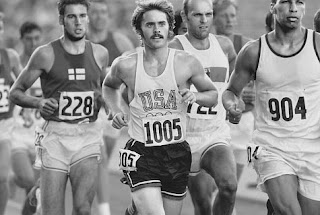Rarely does one get a chance to see a world premiere opera. We passed our chance to see the world premiere of
Before Night Falls last weekend, since we were in Salado, but we switched our tickets to this week, so we got to see the second performance of it on Sunday. Almost as good.
Modern opera typically seems to be in the same category of modern art. Modern art tries so hard to be modern it rejects representational art, favoring the abstract, or preferring social or political badgering to art for the sake of primarily aesthetic purposes. Opera of a century or two ago didn't have any problem being mainstream, having popular appeal. It would have been more like a contemporary Broadway musical. Modern opera tries to distance itself from the Broadway musical, and attempting to be more high brow, just makes itself more boring and tedious. That was the case for Jake Heggie's
Dead Man Walking, which we saw at the Fort Worth Opera last year, and to a lesser extent for Carlisle Floyd's
Of Mice and Men, which we saw in 2008.
This was only partly true of
Before Night Falls. Musically, I like this much better than I anticipated. It was definitely modern, with plenty of dissonance and atonality, but not so much that it sounded like train wreck in the orchestra pit. The composer, Jorge Martin, included musical elements from Cuba, the opera's primary setting, but did so in a rather timid way, barely adding flavor the score. And, like the operas mentioned above,
Before Night Falls lacked many memorable melodies or stand-alone arias. I didn't find there to be any truly remarkable or memorable moments that make the listener sit up and take notice of the song or the singer. All in all, musically, it was flat and even, the music providing an agreeable background for a sung play.
The story itself revolves around the life of Reinaldo Arenas, a Cuban novelist. At the time of Castro's revolution, Reinaldo and his friends embrace the promise of freedom and equality, joining the Revolutionary Army. However, they quickly see the oppression and persecution Castro brings on. Secretly, Reinaldo writes and smuggles his work out of Cuba. He never sees his published work or hears of its international success until confronted in an interrogation room. Only when he agrees to stop writing is he released from prison.
The story of a skilled writer using his skills to denounce a powerful, oppressive regime, risking his freedom and life, appeals to me. I thought of Aleksandr Solzhenitsyn writing
The Gulag Archipelago, exposing the oppression of the Soviet regime and their prison camps. But Arenas was originally arrested not because of his writing, but because of his homosexuality. I would vigorously defend the right of someone not to be arrested and persecuted because of their personal lifestyle choice, but I have a harder time rallying behind him and granting him hero status.
The second half of the opera has Reinaldo escaping from Cuba, tricking the guards into letting him on a boat at Mariel. Once he arrives in New York, he desperately misses his native Cuba, and feels lost, anonymous and unappreciated. He ends up dying of AIDS. I am bothered by the portrayal of AIDS in this kind of art, as if the victim were some kind of martyr. Early in the opera, Reinaldo sings of having a hundred thousand lovers, each of them a poem. He does lament that he is dying not because of tyrants but because of his lovers. Can we not make a connection here? Having a hundred thousand lovers may inspire poetry, but it's not without consequence. Reinaldo's not a martyr, but a victim of his own lifestyle choices.
The Fort Worth production of
Before Night Falls was the world premiere, and the Fort Worth Opera did a terrific job presenting it. In my review of
The Elixir of Love I mentioned the great acoustics at Bass Hall. That was true for this one, too, but there were a few times the music overwhelmed the singers. The sets were pretty bare, but videos and lighting projected on movable, changing screens made the stage seem larger than life. Wes Mason in the role of Reinaldo brought the house down. This must have been a very demanding role; he was on stage almost continually, with most of the opera's action revolving around him.
Martin, with his librettist Dolores Koch, who knew Arenas and translated some of his works, have presented an interesting musical biography of Arenas, but I have a feeling
Before Night Falls won't be one for the ages. The 2110 Fort Worth Opera Festival might feature works by Donizetti, Mozart, and Handel, but
Before Night Falls will be a long-forgotten memory.
But of course, I don't know what I'm talking about, so you can read other reviews
here.






















